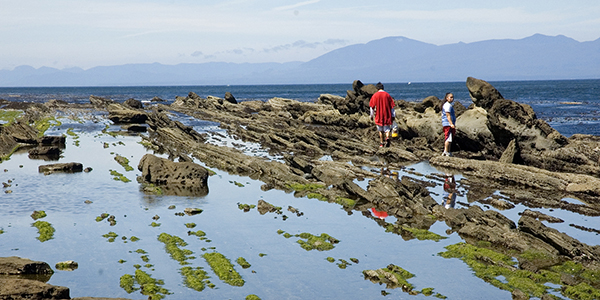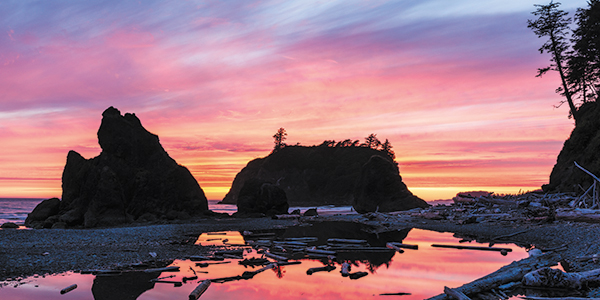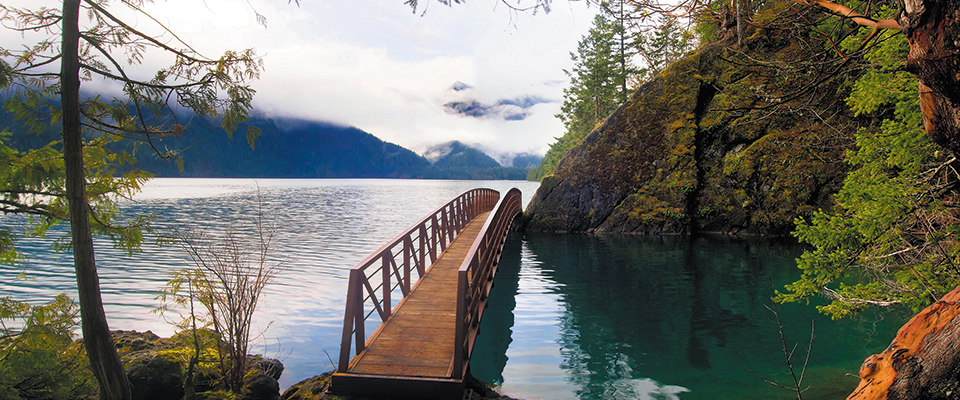Spotlight: Olympic Peninsula
Take a trip around Washington’s favorite mountain and coastal playground
Dense tracts of rugged northwestern wilderness drape across the thinly populated Olympic Peninsula in Washington state. Pockets of civilization ring the region’s edges—you’ll find towns on the rugged coastlines overlooking the Pacific Ocean, Strait of Juan de Fuca, Puget Sound and Hood Canal. Most of the peninsula’s crusty and snow-capped inner core, on the other hand, is comprised of the Olympic Mountains, Olympic National Park and Olympic National Forest.
Make no mistake, if wilderness trails, fishing towns and whale-watching expeditions sound like your idea of a good time, then the Olympic Peninsula will positively knock your socks off.

Visit the Olympics
Start with the Angels
Start your travels in the scenic seaside town of Port Angeles, which not only serves as the gateway to Olympic National Park, but also as a kind of regional hub for tourist exploration in general. From here, visitors can set off on quick and easy day trips deep into the heart of the peninsula or out across the Strait of Juan de Fuca to Vancouver Island and Victoria in Canada.
Take the time to explore the city of Port Angeles itself before jumping off into the wild. The downtown waterfront area is home to a 28-mile coastal sightseeing trail and more than 38 free public sculptures inspired by the geography and biodiversity of the northwest. The main attraction is undoubtedly City Pier, a vibrant public market area that offers the best views in the city of the Olympic Mountains to the south and Vancouver Island to the north. It’s also home to a full slate of annual farmers markets, community festivals and fun fairs that unfold throughout the year.
Check out the Feiro Marine Life Center, which hosts public exhibits representative of the marine life of the Strait of Juan de Fuca. The center’s exhibit on tidepools will make you see these little marine communities in a completely different way.
When you’re ready to get a taste of what Olympic National Park has to offer, there’s no better place to begin than in Port Angeles. One of the park’s three main visitor centers is located directly in town, and from here, visitors can orient themselves to the types of activities and attractions available from the north-side park entrance.
The most accessible natural attraction of the park is Hurricane Ridge, which spans nearly a million square acres, so make this a top priority. From Port Angeles, the ridge is 17 miles away via a scenic paved byway. Alpine hiking trails overlooking glacier-carved gullies and traverses are the reward for hikers.
A short distance to the west sits another popular park destination, the Sol Duc Valley. This idyllic location is defined by its incredibly varied landscape. A combination of old-growth forests, snowy alpine peaks and glacial lakes line the river valley, which is also home to natural hot springs.
Other major points of interest in the park include the Hoh Rain Forest, Quinault Valley, Ozette, Rialto Beach, Kalaloch and Elwha Valley. Exploring Olympic National Park in full means jumping in and out by way of access points on the park’s outer edges, so couple this with a tour of the Olympic Peninsula’s charming small towns. To do this, simply jump on U.S. Highway 101, which rings the peninsula. Every major point of interest in and around the park is accessible via the 101.

Visit the Olympics
Cool Small Town
In addition to its scenic splendor, the Olympic Peninsula also is home to one of the nation’s “coolest” small towns. Port Townsend, located on the northeastern tip of the peninsula, made Budget Travel’s Top 10 list in America’s Coolest Small Towns in 2012. According to Budget, Port Townsend excels in serving up excellent seafood, cheeses and deserts. Its proximity to fantastic outdoor recreation also helped put it high up in the rankings. The town also made Fodors Top 10 list of America’s Best Small Towns, praised for its dining options and lodging quality. Visitors can also find activities ranging from sailing to whale watching, biking to woodworking and from Christmas tree cutting to shell fishing.
Coastal Grandeur
The Olympic National Park protects 73 miles of untouched coastline. Following the trails here means unspoiled views of ocean, cliffs, headlands, islands and seastacks. It’s considered one of the most primitive segments of shoreline in the 48 contiguous states, so hikers are advised to be mindful of their impact on the environment. For day hikes, always be aware of the changeable weather, and carry food, water, raingear and extra layers of clothing. Always stay on the trails to avoid injury or harming of vegetation, and pack all trash. Pets are not allowed on park trails or beaches, except in areas where leashed (up to six feet) pets are permitted.
Forest Fun
Along the way, you’ll notice that Olympic National Forest seems to intertwine with Olympic National Park across the entire peninsula. The forest, in fact, largely encircles the park in three distinct sections: the Hood Canal Ranger District on the western side of the peninsula, the Pacific Ranger District North on the northwestern side and the Pacific Ranger District South on the southwestern side.
The forest is further subdivided into five distinct Recreation Areas: Forks, Dungeness, Hood-Canal-North, Hood-Canal-South, Wynochee and Quinault. Within each of these ranger-staffed areas, an abundance of trails and campgrounds are available to explore. Fishing, kayaking and canoeing are among the most popular activities because of the rich and seemingly never-ending supply of backcountry streams, creeks and rivers.
Major points of interest include Mount Walker Viewpoint and Kloshe Nanitch Lookout. The former is located on the western side of the peninsula, near the towns of Brinnon and Quilcene. A 2-mile hiking trail near the 2,804-foot summit unlocks spectacular panoramic views of Puget Sound and Seattle. Kloshe Nanitch Lookout, located in the northwestern corner of the peninsula, offers incredible views of Lake Crescent and the Strait of Juan de Fuca.
If you’re a hiker, you’ll want to make time for two of the best trails on the entire peninsula. Each is located within Olympic National Forest. The first, Interrorem Nature Trail, has a trailhead near the town of Hoodsport on Hood Canal. The second, Quinault Rain Forest Nature Trail, is located in the southwestern quadrant of the peninsula. These trails are renowned for their landscapes of ancient, old-growth trees, some with diameters of 9-feet or more.
Nature trails in Olympic National Forest are ideal for hikers seeking a less strenuous trip. These are generally less than one mile in length and have signs interpreting resources, features and history of the Olympic National Forest. Many of these trails have easy to moderate grades, making them highly accessible.

Getty Images/iStockphoto
Birding Bonanza
The National Audubon Society has gone the extra mile to develop bird trails for avian watchers seeking to expand their knowledge of Pacific Northwest species. The Olympic Loop of the Great Washington State Birding Trails begins from the Nisqually River delta in south Puget Sound, then winds west, following rivers through moss-draped forests and touches the tip of the contiguous U.S. at Cape Flattery. The route follows the Strait of Juan de Fuca east over the Olympic Peninsula, then wends south along the inland waters of Hood Canal.
Along the Hood Canal, Hamma Hamma Beaver Pond and Mt. Walker Viewpoint have been designated as bird watching hot spots. On the Pacific Coast side, the Lake Quinault Rainforest Trail and Campell Tree Grove area give visitors prime viewpoints for observing a wide variety of birds associated with temperate old growth rainforests.
Visitors can download a free map of the Great Washington State Birding Trail from the U.S. Forest Service website.
Whether you’re a weekend hiker or year-round outdoor adventure enthusiast, the Olympic Peninsula has something for everyone. Few places remain in the world with such a lush, untamed and undeveloped ecosystem, where hints of the past echo loudly into the present.
For More Information
Olympic Peninsula Tourism Commission
800-942-4042
www.olympicpeninsula.org








